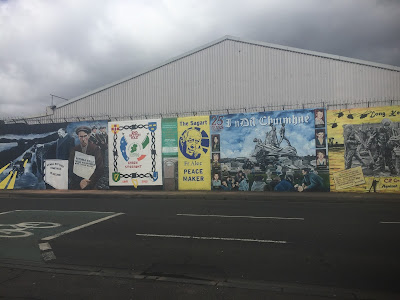Monday we began our road trip, which meant Pierre dove headfirst into driving on the wrong side of both the car and the road. I unenthusiastically offered to take shifts, but Pierre has experienced my abortive attempts to drive manual transmission in France, where I am on the familiar side of the road. He hastened to assure me (to my immense relief) that he had no problem with me acting as co-pilot for the trip. Our gender-normative roles established, we set off, Belfast-bound. Pierre gripped the steering wheel perhaps a little more tightly than usual as I pored over a road map unfolded across the dashboard, providing verbal reminders to buck habit when we came to roundabouts.
 |
| The road north of Dublin. The low stone wall along the highway was a riot of blooming genet, the sun was out, the hills were rolling and the farmland picturesque. |
 |
| Staying in the lane like a pro. |
By far the most interesting thing we did in Belfast was a black cab tour with Michael, a taxi driver who had driven his cab as an illicit Catholic bus during the Troubles, after the barricading of Catholic neighborhoods meant Belfast municipal buses were restricted to Protestant areas. He took us around the Peace Line, a barrier that to this day separates neighborhoods by religion. Michael was full of historical tidbits and personal anecdotes, weaving a picture of guerilla conflict as we toured the protest murals and remembrance gardens which keep the memory of the recent conflict alive.
 |
| A section of the peace walls, slated to be taken down by 2023, although that may be an overly aspirational promise. |
 |
| Murals in the Catholic Lower Falls neighborhood that recall history and grapple with current events. |
Pierre and I were both surprised-- and chagrined at our ignorance-- to see how present the conflict feels. To the two of us, who knew relatively little about the situation and (in my case at least) were too young at the time of the Good Friday Agreement to be reading newspapers regularly, the Troubles were a thing of the past. I vaguely remembered learning at some point that there had been a wall, but I assumed (if I thought about it at all) that it had come down, like its counterpart in Berlin. In fact, it remains
a thorny problem, as territoriality and community segregation are far from a thing of the past. Twenty years, it seems, has not been enough to assuage all grievances, or to restore trust lost over the course of a protracted and violent struggle.
But Belfast was not all somber reflection and activist public art. We spent a lovely afternoon drinking Guinness at The Crown Liquor Saloon, a Victorian-era gin palace complete with stained glass, tile murals, gas lamps, and private wooden booths with elaborately carved doors. It was a suggestion from a Belfast friend, and an excellent one at that.
That night we went to hear an Irish folk rock band play in a pub. Pierre hit it off with a wobblingly drunk Irishman, who advised him not to marry me ("I don't trust her, she's too sober") then bought Pierre a beer and launched into an earnest, slurred conversation. In the interim I chatted with his friend, who told me at length about the Irish sports of
hurling and Gaelic football, which, full disclosure, I didn't know existed. The band was great, the music was fast and full of fiddles, and Pierre and I were happy to make friends.
Next time: the Antrim Coast and Giant's Causeway!





No comments:
Post a Comment